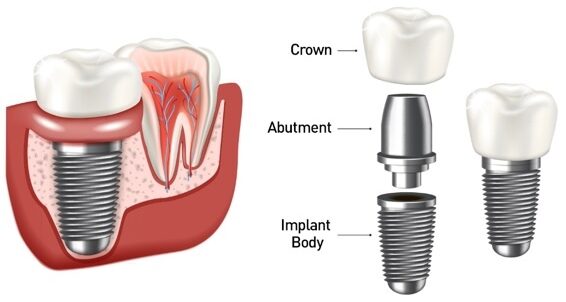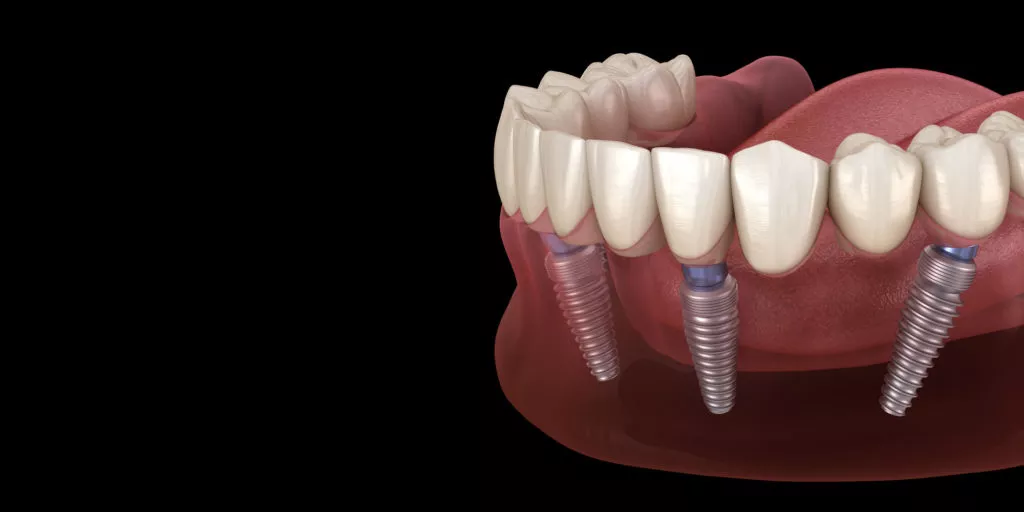When it comes to replacing missing teeth, dental implants have revolutionized the field of restorative dentistry. Over the past decades, advancements in medical technology have made it an increasingly popular solution among those who are suffering from tooth loss.
They provide a strong and permanent way to replace your missing tooth, while restoring the look and function of your tooth. However, amidst the growing interest, it’s crucial to separate fact from fiction and uncover the truth behind dental implants.
If you’re considering dental implants to restore your smile, it is essential that you understand the truth behind this popular dental procedure and recognize that it may not be suitable for everyone. There are many myths and misconceptions about dental implants that can makes it difficult to people with tooth loss to decide whether they’re the right choice.
In the rest of this article, we will explore the inner workings of dental implants and reveal the 10 truth that you need to know when making a decision about whether the procedure is right for you. By separating truth from fiction, we aim to provide you with accurate and reliable information to guide you on your dental implant journey.
What Are Dental Implants?
Dental implants are a type of dental prosthesis that is used to replace one or more missing teeth. They are designed to function as artificial tooth roots that support dental prostheses, such as crowns, bridges, or dentures.
There are primarily three different components that make up a dental implant: implant, abutment, and replacement tooth (crown).
The implant is a small, screw-like post made of biocompatible material that is surgically placed into the jawbone. Through a process known as osseointegration, the implant fuses with the surrounding bone tissue, forming a strong and stable foundation for the installation of the abutment and subsequently the replacement tooth.

When the implant has fully integrated with the jawbone, the abutment is attached to the top of the implant. The abutment is a connector piece that acts as a base for the replacement teeth. It protrudes through the gumline, allowing the dentist to attach a custom-made crown, bridge, or denture to replace the missing tooth or teeth; the crown is designed to match the color, shape, and size of the surrounding teeth to give you a natural smile.
Due to the complexity of implant procedure, it require a series of appointments that take place over 3 to 6 months. However, once installed, dental implants can last a lifetime. They also offer several functional and aesthetic benefits, including improved speech, better chewing ability, and a natural-looking smile. They also help preserve the bone structure of the jaw and prevent further dental problems caused by gaps left by missing teeth.
You may be interested in: What Actually Makes You Loopy After Wisdom Teeth Removal?
Due to the implant procedure, a patient must be free of gum disease or any oral infection, and have sufficient bone density to support the titanium implants. As such, not everyone is a suitable candidate for dental implants. In the event that you are suffering from bone loss, your oral surgeon may recommend you to undergo dental bone graft to increase bone volume and density to the jawbone.
10 Truth About Dental Implants
Dental implants are a remarkable solution for replacing missing teeth, but it important to understand the truths surrounding this innovative treatment.
- Dental implants have a high success rate: The success rate of dental implants is generally very high, ranging from 95% to 98%. However, it’s important to note that success rates can vary depending on several factors, including the location of the implant in the mouth, the patient’s overall health, and their commitment to proper oral hygiene. Certain risk factors such as inadequate bone quantity or quality, systemic diseases, smoking, and poor oral hygiene, can lead to a reduced rate of success for a patient.
- Dental implants are a long-lasting solution: Dental implants are made of biocompatible materials, usually titanium, which are incredibly strong and long-lasting. Unlike other tooth replacement options like dentures or bridges which have a lifespan of 10 to 20 years, dental implants can last for a lifetime with proper care and maintenance. This makes dental implants a relatively affordable option when compared with dentures or bridges over the longer term.
- Preservation of adjacent teeth: Dental implants do not rely on neighboring teeth for support, unlike dental bridges that require the alteration or grinding down of healthy teeth. By preserving adjacent teeth, dental implants help maintain their natural strength and integrity. Additionally, implants provide support and prevent the adjacent teeth from shifting, thereby helping to maintain proper occlusion (bite) and preventing potential complications associated with tooth misalignment.
- Dental implants look and feel natural: Dental implants are renowned for their ability to provide a natural look and feel. They are custom-made to match the color, shape, and size of your natural teeth, ensuring a seamless blend with your existing smile. As such, a dental implant is virtually indistinguishable from the surrounding natural tooth.
- Dental implants are a fixed solution. Unlike dental plates and dentures, dental implants are a fixed solution for replacing missing teeth. This offers stability, functionality, all while eliminating concerns about movement or slippage. This allows individuals with dental implants to confidently bite, chew, and speak.
- Implants are highly versatile. Dental implants are highly versatile in dentistry as they can be used for single tooth replacement, multiple teeth replacement with bridges, full arch restoration with dentures or fixed bridges, and innovative techniques like All-on-4 or All-on-6. This versatility allowed oral surgeons to adapt to various clinical situations and address different tooth loss scenarios with dental implants.
- Dental implant are customized treatment: Dental implants are a highly customized treatment option for replacing missing teeth. From the initial treatment planning to the final restoration, each step is tailored to the individual patient. The alignment and functionality of the implant are carefully adjusted to align with the patient’s bite, allowing for comfortable chewing and speaking. Ongoing follow-up care and maintenance further personalize the treatment to ensure the long-term success of the dental implant.
- Dental implants preserve bone health: Dental implants help prevent this bone loss by integrating with the jawbone through osseointegration. This process ensures that the implant becomes a part of the jaw, providing stimulation and mimicking the function of a natural tooth root. The stimulation from dental implants helps maintain the health and density of the jawbone, preventing bone resorption.
- Dental implants require good oral hygiene. Similar to the natural teeth, dental implants require frequent and consistent care to ensure a long-lasting use. A list of healthy dental care habits includes brushing, flossing, and regular dental check-ups to check the health of the surrounding gums and bone.
- Dental implants are not for everyone. Dental implants are not suitable for everyone due to factors such as insufficient jawbone density, certain medical conditions, untreated oral health issues, lifestyle habits, and financial considerations. Each individual’s eligibility for dental implants is assessed based on their individual circumstances, and it is important to consult with a dental professional to determine if implants are a viable option.
Takeaway
In this article, we have explored the truth behind dental implants, separating fact from fiction and shedding light on this remarkable tooth replacement solution. Dental implants are a safe, predictable, and effective solution for tooth replacement that can last a lifetime with proper care. By preserving bone health, promoting oral hygiene, and restoring normal chewing and speech abilities, dental implants go beyond mere aesthetics to provide comprehensive oral health benefits.
You may be interested in: Dental Bridge vs Implant: Similarities, Differences, and Which Is the Best?
It is essential to understand that dental implants require proper patient selection and treatment planning, ensuring personalized care tailored to individual needs. The surgical procedure involved in implant placement may raise concerns, but with the expertise of a skilled dental professionals and appropriate aftercare, any discomfort can be minimized,
Last but not least, if you’re considering dental implants, consult with a dental professional as they will be able to assess and determine if the procedure is the right option for you based on your individual needs and circumstances.
Reclaim your smile, restore your oral health, and embrace the transformative power of dental implants – the truth revealed.







